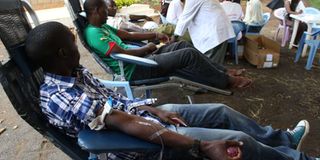Bone dry blood banks leave patients desperate

Residents of Nyeri town donate blood at Boma Hotel on January 14, 2016. Hospitals in Nyanza and Western regions are staring at a crisis after blood banks ran out of supplies.
What you need to know:
- A spot check at the Kisumu Blood Transfusion Centre revealed that it had less than 400 units.
- In Kakamega County, Health Services Executive Collins Matemba blamed the shortage on lack of funding.
Hospitals in Nyanza and Western regions are staring at a crisis after blood banks ran out of supplies.
The situation has left hundreds of patients desperate as they turn to relatives for donations.
A spot check at the Kisumu Blood Transfusion Centre revealed that it had less than 400 units.
The facility has a capacity to store up to 5,000 units.
Kisumu County Director of Health Gregory Ganda told Nation that the shortage is being felt hospitals across the country.
“Our reliance on blood donation from schools [where learners are a steady source of supply]has messed up the collection. Since schools were closed due to Covid-19, the blood supply has shrunk,” Dr Ganda said.
Lack of funding
In Kakamega County, Health Services Executive Collins Matemba blamed the shortage on lack of funding.
Shortage of blood in regional and satellite centres has compelled some hospitals to collect their own. Since the process is costly, patients bear the cost.
In Migori, medics have decried the acute shortage at the county blood bank. Patients have had to seek blood transfusion services in Kisii and Kisumu counties.
Mr Joseph Mboya, a resident of Migori town, said he had to transfer his wife, who was in serious need of blood transfusion, to Kisumu after learning that her blood type was unavailable.
“She urgently needed type A blood, so I had to rush her to Kisumu,” he said.
A medic at Migori County Referral Hospital said the shortage of the precious fluid was occasioned by residents’ aversion to the idea of donating blood.
In Vihiga County, the devolved unit is in a rush to complete construction of a blood bank and transfusion centre at the referral hospital to help address the annual capacity of 2,400 units.
The centre is being set up at a cost of Sh9 million and its completion will reduce the county’s reliance on the regional blood bank in Kisumu.
Emergency cases
Governor Wilber Ottichilo said the shortage of blood has hit hard the emergency cases that need blood transfusion.
Once completed, the centre will facilitate blood donation and storage within the county and reduce the turnaround time in attending to emergency cases.
Health Chief Officer Dr Arnold Mamadi said the transfusion centre needs up to 2,400 units of blood yearly, but only half of this is attained through blood donations. Last year, Kenya collected 164,000 units of blood against the World Health Organization (WHO) recommended minimum of one per cent of the population (480,000 units).
This is the barest minimum the World Health Organization (WHO) expects of Kenya’s population ratio against the maximum of 960,000 units a year.
The government set up six regional blood banks 20 years ago on WHO’s recommendation to streamline blood collection.
This led to a more organised collection, screening, storage and distribution of blood by the banks in Nairobi, Embu, Nakuru, Mombasa, Eldoret and Kisumu.
The plan was heavily funded by the US President’s Emergency Plan for Aids Relief (Pepfar) in the hope that government would step in once US funding ended.
Patients in Kisumu County are having it rough as persistent shortages continues to affect treatment at a time the healthcare system in the country is on its knees due to the ongoing health workers strike.
Turn to relatives
The blood situation in the country has been worsened by the Covid-19 pandemic that has strained healthcare systems.
A patient at St Luke’s Hospital in Kisumu, who was in need of blood Group O, had to turn to a relative to donate the blood to save his life.
An official at the Regional Blood Transfusion Centre said that they had run out of reagents required in the laboratory used in the detection and identification of a variety of blood group antibodies.
The blood received from donors has to be sent to Nairobi for blood group testing.
The gradual withdrawal of Pepfar funding since 2014 and failure by the government to plug the resulting gap have caused a crisis in regional and satellite blood banks.
Funding for the Kenya National Blood Transfusion Service ceased last year.
Reporting by Benson Amadala, Elizabeth Ojina, Derick Luvega and Ian Byron





